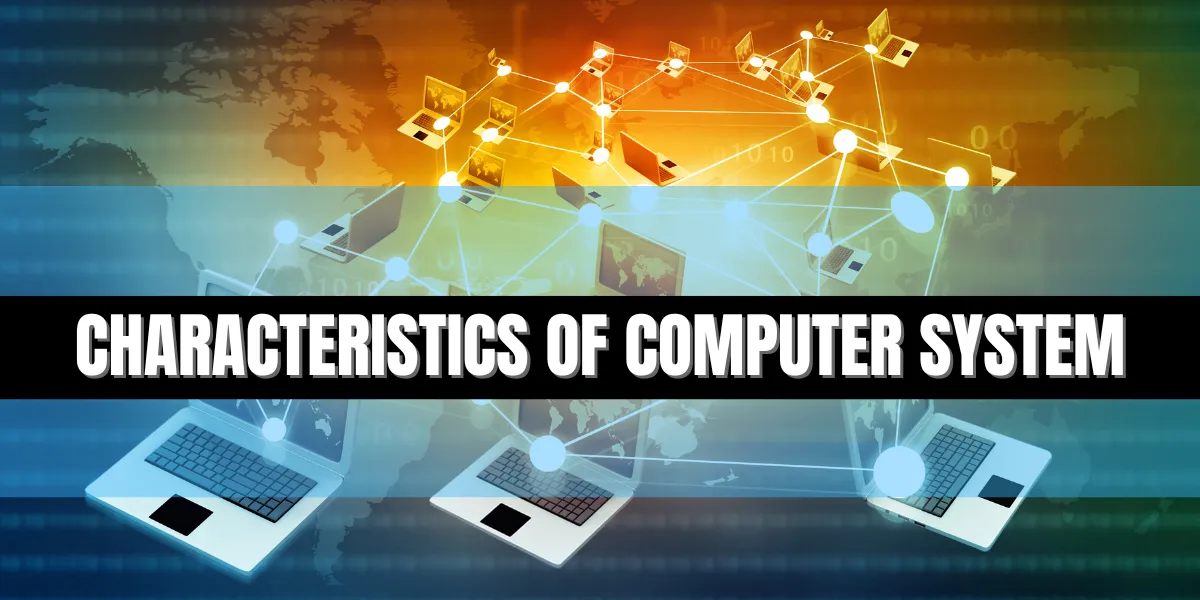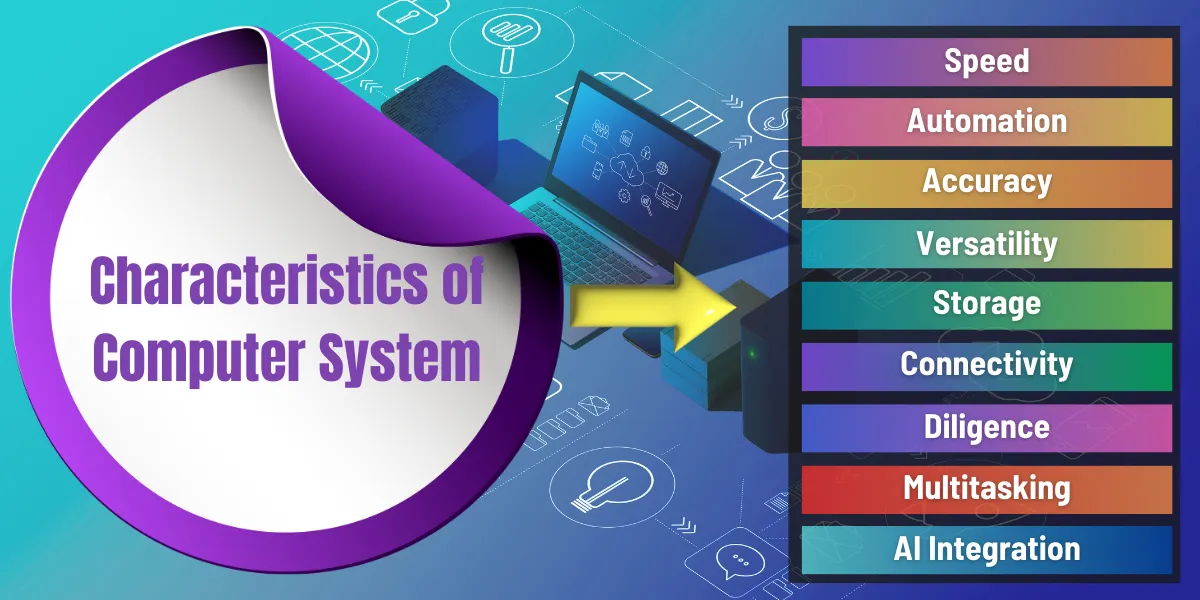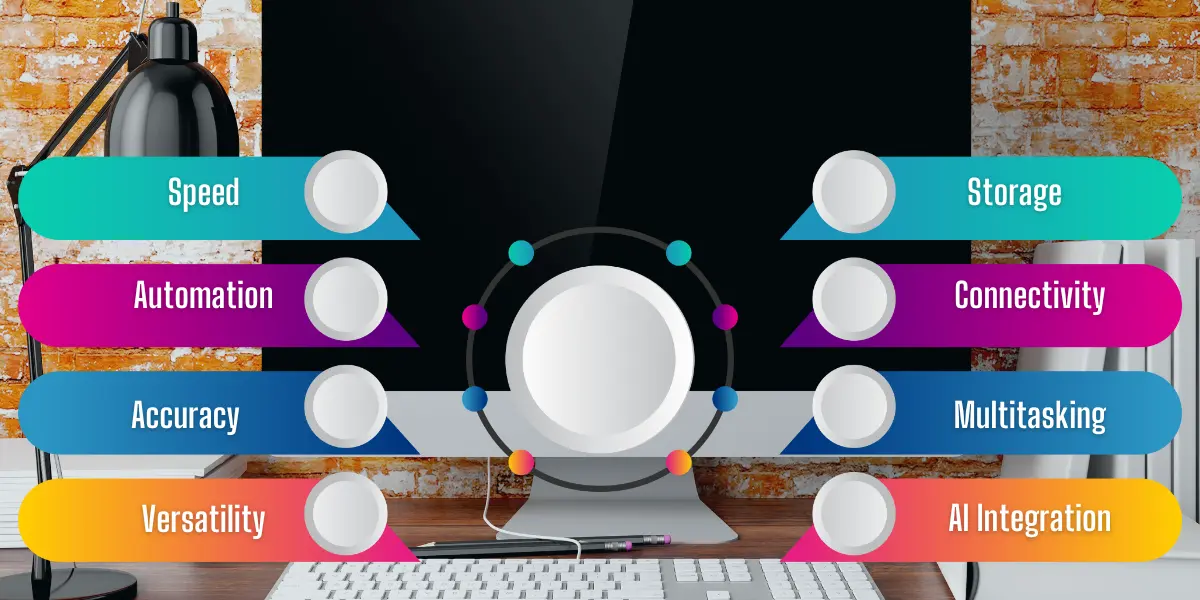9 Key Characteristics of Computer System with Real-Life Examples
Published: 10 Mar 2025
Hey Champs
Have you ever wondered why some computers perform tasks instantly, while others struggle with lag? Understanding the characteristics of computer system helps you make informed choices when buying or upgrading your device. Whether it’s speed, accuracy, or AI-powered intelligence, computers have transformed how we live and work.

In this guide, we’ll explore the 9 key characteristics that define a modern computer system and explain how they impact industries like education, healthcare, business, and entertainment.
What is a Computer System ? (Definition & Components)
A computer system, including personal computers, is a combination of different components working together to process data and perform tasks. It consists of:
- Hardware – The hardware components of a computer, including the central processing unit (processor), memory, input devices (keyboard, mouse), and output devices (monitor, printer).
- Software – The programs and application software that instruct the hardware on what to do. This includes the operating system and other software components or tools.
- User – The person who interacts with the system, providing input and using the output to complete tasks.
Core Characteristics of Computer System

Computers are powerful machines designed to perform tasks with speed, accuracy, and efficiency. In a hurry? Don’t worry! Here’s a quick list of key characteristics that make computer systems indispensable in our daily lives.
- Speed
- Automation
- Accuracy
- Versatility
- Storage
- Connectivity
- Diligence
- Multitasking
- Intelligence (AI Integration)
Let’s explore the above mentioned core characteristics in details:
1. Speed – Blazing-Fast Processing Power

Computers can process data and execute instructions at incredible speeds, much faster than humans. Their high processing power allows them to complete tasks in milliseconds.
- Can process billions of instructions per second, making it possible to handle complex computations instantly.
- Reduces time required for complex tasks like data analysis and simulations.
- Enhances productivity in industries like banking, healthcare, and research etc.
- Example: A supercomputer can perform complex weather forecasting calculations in minutes, a task that would take humans days.
2. Automation – Performing Tasks Without Human Input
Once programmed, a computer can run tasks automatically without human intervention. This makes them reliable for handling repetitive tasks efficiently.
- Follows a predefined set of instructions (software) to complete tasks.
- Minimizes human effort and errors in critical processes.
- Can schedule and execute operations even when unattended.
- Example: Automated bill payments and self-driving cars function without manual input.
Computers are fast, accurate, and never get tired… until you forget to save your work!😆
3. Accuracy – Error-Free Computing

Computers provide precise and error-free results, as long as the input data is correct. They eliminate human calculation errors.
- Performs complex mathematical and logical operations with high accuracy.
- Errors only occur due to incorrect input or programming mistakes.
- Used in scientific research, medical diagnoses, and financial calculations.
- Example: A calculator computes large numbers with perfect accuracy, unlike humans.
4. Versatility – Handling Multiple Types of Tasks
Computers are versatile machines that can perform a wide range of tasks, making them highly adaptable. They are used in various fields for different purposes.
- Supports diverse applications, from gaming to business management.
- Easily switches between multiple tasks without slowing down.
- Used in industries like education, healthcare, entertainment, and engineering.
- Example: A single laptop can be used for coding, watching movies, and editing documents.
5. Storage – Massive Data Retention & Quick Access

As an electronic device, a computer uses storage devices to store vast amounts of data. This ability to retain information over time is known as its remembrance power. Digital storage is more efficient than physical records.
- Saves information in the form of files, databases, and cloud storage.
- Provides quick access to stored data without deterioration over time.
- Allows backup and recovery to prevent data loss.
- Example: A hard drive stores thousands of documents, photos, and videos, like a digital library.
6. Connectivity – The Power of Global Networking
Computers can connect to other devices and networks, enabling global communication, remote access, and data exchange.
- Supports internet access, file sharing, and remote collaboration.
- Helps in managing smart devices and IoT (Internet of Things) systems.
- Enables instant communication through emails, video calls, and messaging apps.
- Example: A smartphone controlling smart home devices like lights and security cameras.
7. Diligence – No Fatigue, 24/7 Operation
Unlike humans, computers do not experience fatigue or distractions. They can work continuously without breaks.
- Operates 24/7 without losing efficiency or concentration.
- Ideal for performing repetitive and long-duration tasks.
- Reduces dependency on human labor in industries.
- Example: A web server runs non-stop, handling millions of website requests daily.
8. Multitasking – Running Multiple Programs Simultaneously

Computers can run multiple programs at the same time without performance issues. This improves efficiency and productivity.
- Allows users to work on different applications simultaneously.
- Handles multiple operations without affecting speed.
- Essential for businesses, research, and personal computing.
- Example: A user can browse the web, edit a document, and play music at the same time.
9. Intelligence (AI Integration) – Smarter Decision Making
Modern computers use artificial intelligence to learn, analyze data, and improve decision-making. AI enhances automation and problem-solving capabilities.
- Uses machine learning to adapt and improve performance.
- Helps in voice recognition, image processing, and predictive analysis.
- Widely used in healthcare, robotics, and virtual assistants.
- Example: Virtual assistants like Siri and Alexa understand voice commands and provide smart responses.
Summary of Computer System Characteristics

Here’s a simple table of core characteristics of computer to help beginners understand easily.
Characteristic | Description | Example |
Speed | Computers process data at incredible speeds, completing tasks in milliseconds. | A supercomputer predicting weather changes. |
Automation | Once programmed, computers perform tasks without human intervention. | Automated bill payments. |
Accuracy | Produces error-free results unless input is incorrect. | A calculator performing complex math. |
Versatility | Can handle multiple tasks across different industries. | A laptop used for gaming, coding, and video editing. |
Storage | Stores vast amounts of data for easy retrieval. | Cloud storage for online backups. |
Connectivity | Links with other devices and networks for data sharing. | Smartphones controlling smart home devices. |
Diligence | Works continuously without fatigue or breaks. | A web server running 24/7. |
Multitasking | Runs multiple programs at the same time efficiently. | Browsing the web while listening to music. |
AI Integration | Uses artificial intelligence to enhance automation and learning. | Virtual assistants like Siri and Alexa. |
Real-Life Applications of These Characteristics
Computers play a vital role in various industries by improving efficiency, accuracy, and automation. The characteristics of a computer system help businesses, healthcare, education, and other sectors work smarter and faster. Here’s how these features benefit different industries:
Education – Smart Learning Solutions
Computers have transformed learning, making education more accessible and engaging.
- Speed & Storage: Online learning platforms store vast amounts of study materials.
- Connectivity: Students and teachers connect globally through virtual classrooms.
- Automation: AI-driven tools grade assignments and provide instant feedback.
- Example: E-learning platforms like Coursera and Khan Academy provide digital courses for students worldwide.
Healthcare – AI & Precision in Medicine
Computers enhance medical research, patient care, and hospital management.
- Accuracy: Medical software ensures precise diagnoses and treatment plans.
- Storage: Electronic health records (EHRs) store patient histories securely.
- AI Integration: AI assists doctors in detecting diseases through medical imaging.
- Example: AI-powered tools help detect cancer in early stages by analyzing X-rays and scans.
Business & Finance – Data-Driven Decision Making
Computers streamline operations, transactions, and decision-making in businesses.
- Multitasking: Businesses use software for payroll, accounting, and customer management simultaneously.
- Speed & Automation: Online banking and automated financial transactions save time.
- Connectivity: Companies collaborate remotely using cloud computing.
- Example: E-commerce platforms like Amazon use AI to recommend products based on customer preferences.
Entertainment & Media – Enhancing Creativity
From gaming to movie production, computers enhance creativity and content distribution.
- Versatility: Computers support video editing, graphic design, and music production.
- Storage: Streaming services store and manage massive media libraries.
- AI Integration: AI-driven recommendations personalize user experiences on platforms like Netflix.
- Example: Video game engines use AI to create realistic gaming environments.
Transportation & Smart Cities – AI-Powered Navigation
Computers improve transportation efficiency and city planning.
- Automation: Self-driving cars and smart traffic systems reduce congestion.
- AI Integration: AI-powered navigation apps suggest the fastest routes.
- Connectivity: Smart city infrastructure connects systems for better management.
- Example: Google Maps uses AI to provide real-time traffic updates and optimize travel routes.
Scientific Research & Space Exploration
Computers process massive amounts of data for groundbreaking discoveries.
- Speed: Supercomputers perform complex simulations in minutes.
- Accuracy: Data analysis tools help scientists make precise calculations.
- Storage: Large databases store critical research findings for future use.
- Example: NASA uses supercomputers to predict space weather and plan space missions.
Conclusion
So champs, in this article, we’ve covered characteristics of computer system in detail. From speed and accuracy to automation and AI, computers have transformed the way we live and work. Personally, I recommend exploring cloud storage solutions if you want to make the most of your computer’s storage capability. It’s a great way to keep your data secure and accessible anytime.
What do you think? Now that you know the key characteristics of computer system, which one do you find most important—speed, automation, or AI? Let us know in the comments! If you found this article useful, share it with others who might be curious about computers!
FAQs
Here are some FAQs beginners ask about the characteristics of a computer.
There is no single most important characteristic, but speed, accuracy, and automation are key. Computers process data at incredible speeds, making tasks easier and faster. Their ability to work without breaks makes them essential in all industries.
Computers achieve high-speed processing through:
- Central Processing Unit (CPU) – Executes millions of instructions per second (measured in GHz).
- Random Access Memory (RAM) – Temporarily stores active data, reducing load times.
- Solid-State Drives (SSDs) – Provide faster data access compared to traditional hard drives.
- Parallel Processing – Uses multiple CPU cores to handle different tasks at once.
- Optimized Software Algorithms – Improve efficiency in executing complex calculations.
For example, supercomputers like IBM Summit process 200 quadrillion calculations per second, making them crucial for scientific research.
Computers don’t make mistakes on their own, but they can produce errors due to wrong input, software bugs, or hardware issues. If a user enters incorrect data, the output will also be wrong. This is known as the GIGO principle (Garbage In, Garbage Out).
Storage devices determines how much data, files, and applications a computer can hold. A higher storage capacity means you can save more photos, videos, and documents. It also helps computers run smoothly by providing space for operating systems and software updates.
Computers use Wi-Fi, Ethernet cables, or mobile data to connect to the internet. This allows them to access websites, send emails, and stream videos. Connectivity helps computers share data and communicate with other devices worldwide.
Artificial Intelligence (AI) helps computers learn, adapt, and perform human-like tasks. AI powers voice assistants like Siri, recommendation systems on Netflix, and self-driving cars. It makes computers smarter and more interactive.
Computers use their processor, RAM, and operating system to run multiple programs at once. This means you can browse the internet, listen to music, and edit a document simultaneously. Multitasking helps users get more done in less time.
Computers don’t experience fatigue or emotions like humans. They can work 24/7 without slowing down, as long as they have power. This is why they’re used in industries like banking and space exploration, where continuous operation is needed.
Computers make life easier by helping with work, entertainment, communication, and education. People use them for online shopping, video calls, streaming movies, and managing finances. Almost every industry relies on computers for efficiency.
Future computers will be faster, smaller, and more intelligent with advanced AI and quantum computing. They may use brain-computer interfaces, making direct communication between humans and machines possible. Technology is evolving rapidly, and computers will continue to shape our world.

- Be Respectful
- Stay Relevant
- Stay Positive
- True Feedback
- Encourage Discussion
- Avoid Spamming
- No Fake News
- Don't Copy-Paste
- No Personal Attacks

- Be Respectful
- Stay Relevant
- Stay Positive
- True Feedback
- Encourage Discussion
- Avoid Spamming
- No Fake News
- Don't Copy-Paste
- No Personal Attacks



